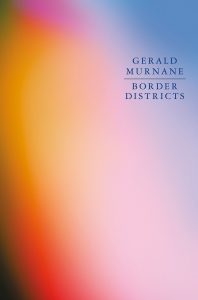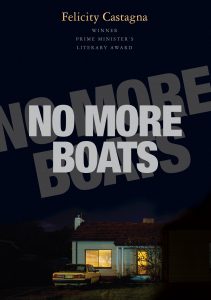Border Districts and No More Boats shortlisted for the 2018 Miles Franklin
We are thrilled that Border Districts by Gerald Murnane and No More Boats by Felicity Castagna have been shortlisted for the 2018 Miles Franklin Literary Award. The announcement was made at a ceremony in Canberra on Sunday, 17 June. Giramondo is the only publisher to have more than one of their published works on the finalist list.
Gerald Murnane, author of 12 fiction works and a ‘neglected literary giant’ according to the Sydney Morning Herald, has made the list for the first time and given his ‘first nod in [a] 44-year career’. Approaching his eightieth year and now ‘delivered of [his] books’, the New York Times proposed in March that he may be ‘the greatest living English-language writer most people have never heard of’. Border Districts has also been shortlisted for the ALS Gold Medal.
No More Boats is Felicity Castagna’s debut adult novel, which tells the unravelling of a man and a nation at the time of the Tampa crisis. ‘I wanted to ask questions about what happens when we cut off our past,’ Castagna told Jason Steger for the Sydney Morning Herald. ‘But also to ask how the trauma of separating yourself from your past and actively suppressing it can come out later in your life in your relationships with other people and in your understanding of the world.’ No More Boats was shortlisted for the 2018 NSW Premier’s Literary Awards, and her previous novel The Incredible Here and Now won the 2015 Prime Minister’s Award for Young Adult Fiction.
The winner of the $60,000 prize will be announced on 26 August.
The occasion for this novel is the narrator’s move to a remote district near the border to be alert to what might be described as the landscape of his own mind. We are told that what we are reading is a ‘report’, intended only for the narrator’s own files, on the series of mental images that are set in train by a very ordinary sight: a tiny church and its porch window that is passed daily on the morning walk to the shops and the post office. From here, we follow the narrator down certain rabbit holes into his history that centre on books read, people recalled, objects owned and locations visited.
The focus is on paying attention to the vines of thoughts and feelings, then and now, that wind around and cling to these things. The telling is lyrical, precise, highly self-aware and, at times, disarmingly humorous. The result is a subjective portrait of certain religious, geographical, architectural, social and cultural textures of life as it has been lived in Australia over the past seven decades. This novel, a consolidation of the idiosyncratic aesthetic programme Murnane has pursued throughout his career, gestures towards the capriciousness of consciousness, the relationship between fiction and fact and the purpose of writing itself.
Judges’ comments
This novel brings to life an Italo-Australian migrant family living in Parramatta, that historic town at the border of Sydney’s western suburbs, on the river ‘where salt water met fresh and the boats could go no further’. It is 2001, the time of the Tampa crisis when the prime minister intoned, ‘we will decide who comes to this country and the circumstances in which they come.’ His words resonate with Antonio Martone, unhinged by grief for his dead friend and his forced retirement from the building business they shared. When he paints ‘No More Boats’ on his front yard, his alienation from his English-born wife and adult son and daughter is complete.
Castagna skilfully dramatizes the generational conflicts as well as the everyday multiculturalism of the Martones’ relationships with family and friends. Borders, boats and homes are powerful motifs in this novel. It conveys a vivid sense of a decisive historical moment, as the events of 9/11 loom – events that generated ‘all those connections between Muslims in planes and Muslims on boats’ that have marked Australian life ever since.
Judges’ comments


